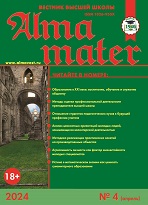https://doi.org/10.20339/AM.11-17.112
E.A. Britikova is Cand.Sci. (Sociology), senior lecturer at Kuban State Agrarian University n.a. I.T. Trubilin e-mail: britikova-2011@mail.ru
Presented is theoretical and empirical analysis of transformation processes of Russian society of the years of 1990–2000 from the point of view of modernization of education. From political nature of domestic society, as well as the overall strategy of integration into world economic system, natural leading role of powerful factors is naturally determined. Substantiated is ambiguity of this situation: on the one hand, it predetermined partial sense of post-Soviet modernization, on the other hand, it provided preservation of national social system. Conclusion is made, that under present conditions of factual failure of Europe from integration with Russia and sharpening of geopolitical situation constructive meaning of power resources might be growing.
Key words: power structures, subjects of modernization, social resources, transformational structure, Russian society, globalization, world system, economic of raw materials.
References
- Bеlyaeva, L.A. Social stratification and the middle class in Russia: 10 years of post-Soviet development. Мoscow, 2001.
- Britikova, E.A. Modernization and globalization: perspectives and controversies. Society and the law. 2014, no. 1 (47), pp. 286–290.
- Globalization of opposition: struggle in the world. Moscow, 2004.
- Delyagin, M. Russia after Putin. Is “orange-green revolution” inevitable in Russia. Мoscow, 2005.
- Zaslavskaya, T.I. Modern Russian society: Social mechanism of transformation. Мoscow, 2004.
- Zaslavskaya, T.I. The structure of Russian society through the prism of transformational process. In: Societal transformation of Russian society. Мoscow, 2002, pp. 519-545.
- Каgarlitsky, B.Yu. Governed democracy: Russia, which was imposed on us. Еkaterinburg, 2005.
- Кryshtanovskaya, О.А. Anatomy of political elite. Мoscow, 2005.
- Latov, Yu.V. Pluralistic system of defense of property rights of entrepreneurs. In: Where did Russia come? Resume of societal transformation. Moscow, 2003, pp. 280–286.
- Оkol’skaya, L. Average lucky man from presidential reserve. URL: http://www.isras.ru/institute_news.html?id=973&printmode
- Social exfoliation and social mobility. Мoscow, 1999.
- Shlyapentokh, V.E. Modern Russia as a feudal society. New glance to post-Soviet era. Мoscow, 2008.











.png)






